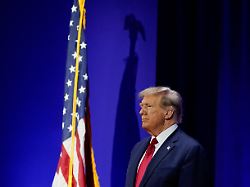The clock is ticking. Donald Trump has to present a huge guarantee by the end of March. If he doesn’t succeed, the public prosecutor’s office has already announced enforcement.
Can’t he or doesn’t he want to? One thing is certain: Donald Trump has until March 25 to deposit a security deposit of almost half a billion dollars. His lawyers failed in their first attempt to negotiate the sum down to $100 million. If Trump does not manage to raise the required money by the deadline, he will be threatened with the seizure of his real estate. The fact that Trump has appealed doesn’t change that.
The background: A few days ago, Trump was ordered by a court in New York to pay a fine including interest of almost $454 million. The judge saw it as proven that Trump had repeatedly overstated his net worth in order to obtain more favorable terms for loans and insurance for his real estate company.
Trump rejected the allegations in his own way: In reality, his assets were much larger than what he told the banks. His company currently has well over $400 million in liquid assets, he assured the court. The fact that Trump’s company does not have to publish business figures due to its – completely normal – legal structure cannot be verified by the ex-president’s information.
To raise the money, Trump could be forced to sell real estate interests. He probably wants to avoid that – because if he has to find a buyer at short notice and under pressure, that will drive down the price. In addition, Trump’s real estate portfolio may be less valuable than commonly assumed.
Reporter sued
In the 1990s, Trump began to stop building real estate like his father had done. Instead, he focused on licensing his name and collecting money for it. Trump also took part in projects that other companies developed. The value of his portfolio is also difficult to estimate because the properties it contains may be subject to mortgages.
Flaunted wealth has been the basis of Trump’s business model since the 1980s. How much of it is substance and how much is froth? Not clear. Trump has a habit of vastly inflating his actual net worth. “My net worth fluctuates,” The Week magazine quotes Trump from a 2007 affidavit after he sued a New York Times reporter because the journalist had allegedly underestimated Trump’s assets. “It rises and falls with markets and attitudes and feelings – even my own feelings.” The lawsuit was dismissed.
In 2019, the Washington Post analyzed numerous documents that Trump had sent to lenders, business partners and journalists in previous years in order to leave the impression of an extremely rich person. The conclusion: The papers contained a lot of false information and mortgages were not always mentioned. Trump once claimed that his vineyard in Virginia was 2,000 hectares in size. It is only 1200 hectares in size. Another time he claimed that Trump Tower in New York had 68 floors. He has 58.
The financial news agency Bloomberg estimated his net worth at $2.4 billion in 2021. The business magazine “Forbes” put it at $2.6 billion in 2023. These are significant sums. The crucial question is how much money Trump can actually raise if necessary.
Attorney General’s Office threatens
The deposit that Trump must provide is comparable to a bank guarantee. And it is likely that Trump will only get this if the bank receives significant amounts of collateral from him. He may have to provide guarantees for the entire amount. Because Trump is associated with bankruptcies of projects, disputes over bills and a tendency to exaggerate. Regardless, getting a guarantee worth nearly half a billion dollars is a complex process.
In the event that Trump cannot pay, New York Attorney General Letitia James, who filed the fraud lawsuit, has already announced that he will seize his properties: “I look up every day [das Trump-Gebäude mit der Adresse] 40 Wall Street.”
